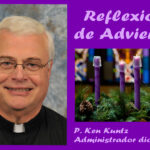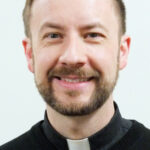This week’s Catholic Messenger features stories about parish planning and collaboration and the announcement of priest assignments, a natural outcome of the planning process. Three months from now, 17 priests in the Davenport Diocese will begin a process of transition — 15 to new or expanded ministries, one to sabbatical and one to retirement.
Transitions evoke mixed emotions for clergy and laity alike as we contemplate the changes ahead and what we’re leaving behind. Consider the scarcity of human resources: fewer priests to minister and fewer parishioners to fill the pews and fulfill needs inside and outside the parish walls. Diocesan Director of Planning Dan Ebener said that of the 70 active priests in the diocese today, as many as 16 will be eligible to retire over the next four years. Ordinations of new priests are estimated at one or two per year. Rather than lament, we can choose to be proactive in supporting our priests in their ministry and priesthood.
“What I ask of my parishioners is to pray for me,” said Father Francis Odoom, pastor of Our Lady of the Holy Rosary-Lost Nation, Ss. Philip & James-Grand Mound, and Sacred Heart-Oxford Junction. “Prayer for priests acts like an external source of power which drives what we do; we need that every day! It fills me with great delight and joy when someone tells me that they prayed for me.”
Generous response to serving the various needs of our parish or parish cluster is another way to support our pastor in his priestly ministry. As Bishop Thomas Zinkula says in his editorial on this page, “the Second Vatican Council encourages ‘full, conscious and active participation’ in the Mass.” Such participation in the Mass prepares each of us to respond to needs within and outside of our parishes.
We should get to know the priest who serves our parish as pastor, parochial vicar or sacramental minister. Listen to what he talks about in his homilies. How do those homilies relate to what is happening in our parish, in the world at large, and in the life of the priest delivering the message? What can we do to respond?
Invite the priest or priests to dinner. Drop off a pot of soup or a ready to eat entrée on occasion. Send a card to commemorate the priest’s birthday and ordination anniversary. If he enjoys reading, find out what he likes to read and get him a book. If he enjoys sporting events, get him tickets to games.
Create a transition team to journey with a priest new to your parishes. “Transitioning into a new assignment is not easy at all,” Fr. Odoom says. “There is the part where parishioners are missing a beloved transferred priest with whom they have become familiar, and there is the part of bracing up for the change…. The various leadership teams can help to bring their new priest up to speed on relevant parish conversations. This can be done at both the formal meeting settings and the necessary informal conversations that occur during the time of transition. The goal here is to help the new priest identify with the stories of the community in order to feel connected.” Fr. Odoom recalls a parish potluck organized to welcome him to his parishes. “This helped me to feel at home and to learn the stories.”
Father Guillermo Trevino, who is moving to a new assignment in July, said parishioners can help priests in his situation by “trusting in the process. Support the priest whoever it may be. Give honest feedback but don’t make it a gripe session,” said Fr. Trevino, who will serve as parochial vicar for St. Patrick Parish in Iowa City and St. Joseph Parish in West Liberty. “Just like a parent shouldn’t have a favorite child, (parishioners) shouldn’t have a favorite priest.”
Prepare to share. It’s not easy for parishes to share a priest, but it is becoming more of a reality. Twenty-nine diocesan priests serve more than one parish, Ebener notes. “One of the main challenges that priests may face regards how to meet the needs of each one of the churches in the best way possible,” Fr. Odoom says. “There is also the aspect of pastoral unity, in the sense of collaboration and not having things only in one’s way. This calls for a lot of listening, prayer and discernment. It needs time, energy and God’s guidance.”
Barb Arland-Fye, Editor
(arland-fye@davenportdiocese.org)











